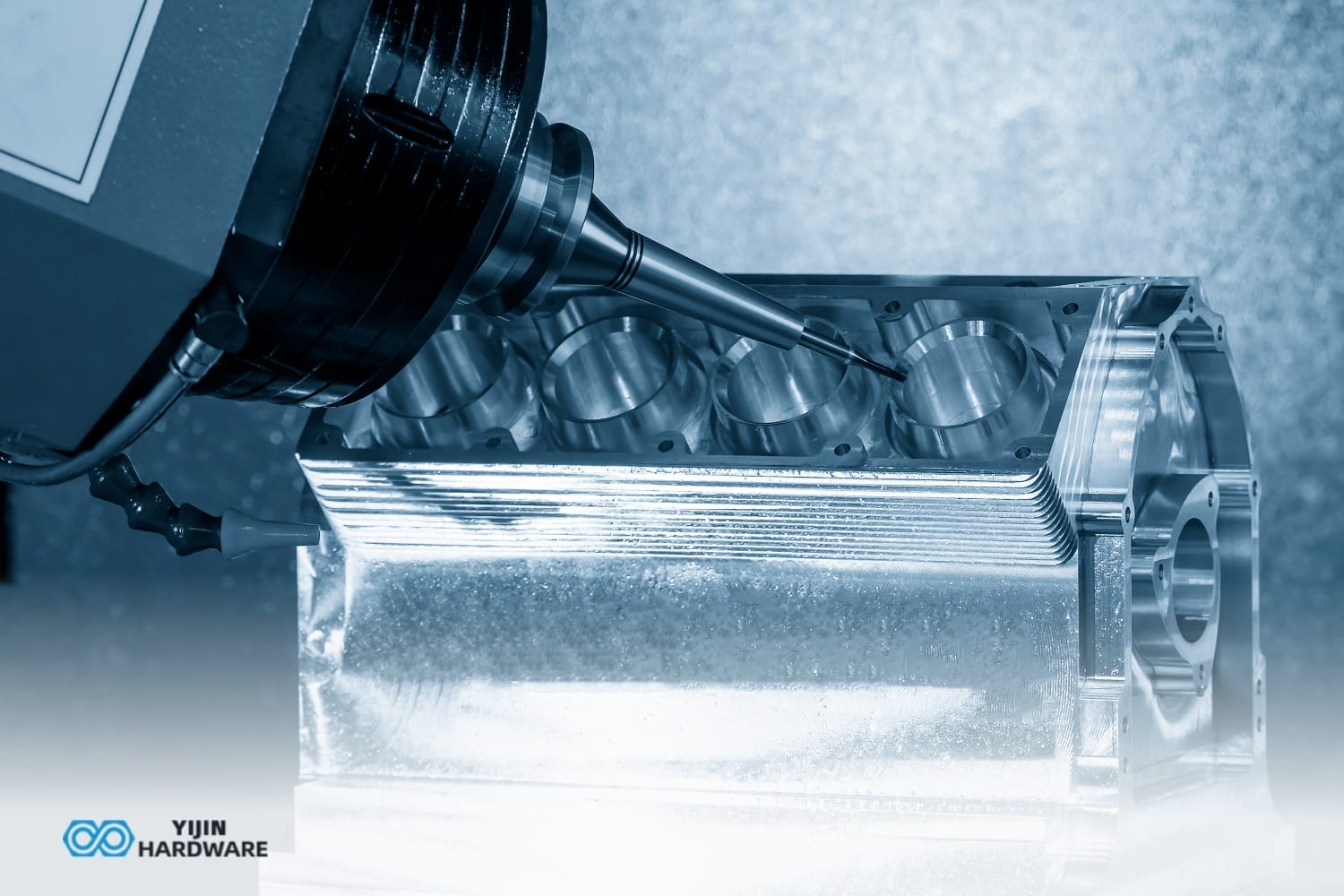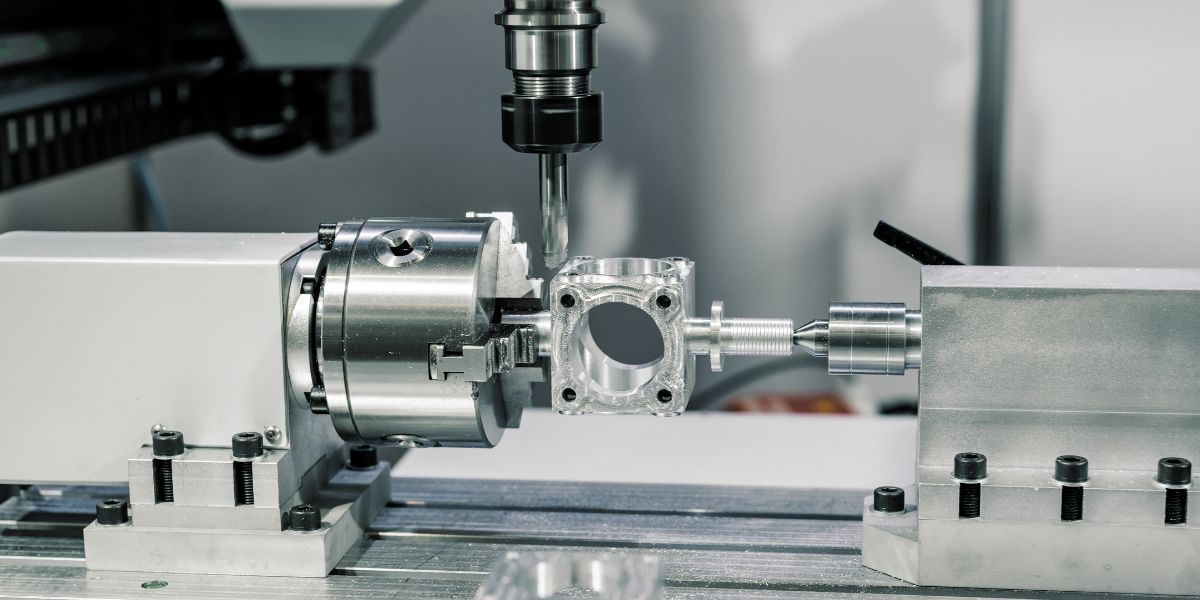Exactly How CNC Machining Providers Boost Efficiency in Milling and Turning Processes
CNC machining services play a crucial duty in boosting performance within milling and turning procedures. By utilizing automation and accurate control, these services lessen human mistake and warranty regular result. The capacity to take care of intricate geometries and keep limited resistances streamlines production. The complete level of CNC modern technology's influence goes past fundamental effectiveness gains. There are deeper ramifications and future trends that require further expedition.
The Essentials of CNC Machining
CNC machining is an exact production process that utilizes computer-controlled machines to generate detailed components and elements. This technology employs computer-aided design (CAD) software to produce comprehensive models, which are then equated right into device directions. The process usually involves various procedures such as milling, turning, and drilling, making it possible for producers to achieve high degrees of precision and repeatability.
CNC devices are equipped with innovative tooling that can control materials like steel, plastic, and wood. They operate through a collection of commands that dictate movements, speeds, and tool changes, decreasing human error and enhancing production efficiency.
The automation intrinsic in CNC machining enables tight resistances and complex geometries to be constantly generated, making it a recommended choice in sectors requiring accuracy, such as aerospace and automotive. Comprehending the fundamentals of CNC machining is necessary for appreciating its function in modern manufacturing procedures.
Advantages of CNC Machining in Milling
CNC machining uses substantial advantages in milling procedures, specifically concerning accuracy and precision. This innovation not just boosts production speed yet additionally allows for the development of intricate designs that would be testing to attain manually. Consequently, services can boost efficiency and broaden their abilities in production.
Precision and Accuracy
Attaining unequaled accuracy and precision in milling processes is a hallmark of advanced machining strategies. CNC machining services make use of computer-controlled systems that meticulously perform styles with marginal human treatment. This automation assures that each cut and shape is executed to exact specifications, considerably decreasing the danger of mistakes commonly related to hand-operated milling. The capability to produce intricate geometries with tight tolerances is a key advantage, allowing manufacturers to meet stringent top quality needs. In addition, CNC equipments can keep constant performance across multiple runs, guaranteeing harmony in manufacturing. This degree of precision not only enhances item top quality however likewise decreases material waste, leading to more reliable use resources. In general, CNC machining services change milling procedures with their commitment to precision and information.
Enhanced Production Rate
Speeding up production rate is among the standout benefits of modern machining solutions. CNC machining greatly reduces the moment required for crushing processes by automating operations and decreasing hands-on intervention. Equipments can operate continuously, permitting for enhanced result without compromising quality. The capacity to program several jobs right into a solitary arrangement additionally improves production, making it possible for manufacturers to full complicated tasks in less time. Additionally, CNC equipments preserve high-speed reducing abilities, causing quicker material elimination and faster cycle times. This enhanced effectiveness translates to much shorter lead times, making it possible for companies to react promptly to market demands. On the whole, enhanced manufacturing rate through CNC machining not just enhances efficiency yet also enhances affordable benefit in the manufacturing market.
Facility Design Abilities
The capacity to create elaborate layouts is a significant advantage of contemporary machining solutions. CNC machining allows for the production of complicated geometries that would certainly be tough, if not impossible, to accomplish utilizing typical methods. This ability comes from innovative shows and automated tools that precisely comply with digital plans, ensuring precision and repeatability. Consequently, makers can create detailed components with limited resistances, optimizing performance in various applications. Additionally, the versatility of CNC devices makes it possible for quick changes to make requirements without considerable retooling, streamlining the production procedure. This flexibility not just boosts creative thinking in style however likewise enables effective testing and development, providing companies an one-upmanship in the ever-evolving market.

Advantages of CNC Transforming Processes
CNC transforming processes use significant benefits in manufacturing, specifically relating to precision and precision. These processes enable the creation of very detailed elements with minimal tolerances, ensuring high quality in manufacturing. Furthermore, the performance of CNC turning adds to reduced preparations, enabling quicker distribution of completed items.
Precision and Accuracy
Precision and accuracy are hallmark attributes of CNC transforming processes, establishing them apart in the production landscape. These processes use computer system mathematical control to guide cutting devices with unmatched exactness. This results in elements that fulfill strict specs and resistances, reducing the probability of mistakes. CNC transforming enables repeatable and regular production, guaranteeing that each component is basically identical, which is important in markets calling for high criteria, such as aerospace and medical gadgets - fast prototyping. Additionally, advanced software application and modern technology make it possible for real-time changes throughout machining, boosting overall quality. By reducing human mistake and making the most of control over the manufacturing process, CNC turning services deliver exceptional Full Article precision and accuracy, making them a vital option for contemporary manufacturing needs
Reduced Lead Times
Reduced lead times are a significant benefit of CNC turning procedures, originating from their capacity to automate and maximize production. CNC turning machines run with high performance, enabling for fast setup and implementation of numerous tasks without the need for extensive hand-operated treatment. This automation reduces downtime and accelerates the production procedure, allowing quicker turnaround for orders. In addition, CNC innovation enhances uniformity and minimizes errors, which better adds to faster manufacturing cycles. Therefore, companies can fulfill tight target dates and react immediately to market demands. By leveraging CNC transforming processes, firms can enhance workflows, boost resource appropriation, and eventually enhance their one-upmanship via decreased preparations.
Precision and Accuracy in Manufacturing
While making processes have actually developed substantially throughout the years, the significance of precision and precision remains extremely important. In CNC machining, these two components are vital to generating premium components that satisfy specific specifications. The assimilation of advanced computer modern technology enables careful control over machining criteria, guaranteeing that components are crafted with minimal discrepancy from desired designs.
Precision in making describes the repeatability of processes, while accuracy signifies just how closely a finished component straightens with its intended dimensions. CNC equipments utilize advanced software page program and devices that enable producers to accomplish both, visibly reducing the margin for error - cnc turning service. This capacity is particularly important in markets such as aerospace, vehicle, and clinical, where also small errors can cause tragic failings

Reducing Lead Times With CNC Modern Technology
CNC technology accelerates manufacturing timelines by improving the machining process. By automating jobs, CNC machines decrease hands-on treatment, considerably decreasing the moment required for arrangement and operation. This performance enables suppliers to respond promptly to market demands, meeting orders quicker than conventional machining methods permit.
Furthermore, CNC innovation uses fast prototyping abilities, enabling quick models and modifications based on client comments. The precision of CNC machining makes certain that components are produced correctly the very first time, decreasing the chance of pricey mistakes and rework.
Furthermore, advanced organizing and shows abilities optimize process, allowing multiple operations to run concurrently. This combination of innovation not only reduces lead times but also enhances total performance. Inevitably, the fostering of CNC machining solutions gears up producers with the tools necessary to meet limited due dates while maintaining top quality standards in production.
The Future of CNC Machining in Sector
As makers progressively adopt CNC technology to simplify procedures and decrease lead times, the future of CNC machining in sector appears promising. Technologies such as fabricated knowledge and artificial intelligence are established to reinvent the capabilities of CNC equipments, improving their precision and flexibility. These improvements will promote real-time tracking and anticipating upkeep, minimizing downtime and maximizing production performance.
Additionally, the integration of Net of Things (IoT) technologies will certainly enable far better data collection and evaluation, enabling manufacturers to make enlightened decisions that additionally enhance operational efficiency. The surge of additive manufacturing along with CNC machining is expected to complement standard original site approaches, supplying better style adaptability and material effectiveness.
In addition, as sustainability ends up being a priority, CNC machining is progressing to incorporate eco-friendly techniques, which will draw in eco mindful customers. Overall, the future of CNC machining is defined by continuous development and adaptation, placing it as a cornerstone of contemporary production.
Frequently Asked Concerns
What Products Work With CNC Machining Solutions?
CNC machining solutions are suitable with various materials, consisting of steels like steel, titanium, and light weight aluminum, as well as plastics such as acrylic and polycarbonate. Timber and compounds additionally suit CNC processes for diverse applications.
Exactly How Does CNC Machining Compare to Standard Machining Approaches?
CNC machining supplies higher automation, precision, and consistency compared to conventional techniques. It lowers human mistake, raises manufacturing rate, and enables intricate layouts, making it a premium option in contemporary manufacturing settings.
What Industries Advantage one of the most From CNC Machining Providers?
The aerospace, auto, medical, and electronics industries profit substantially from CNC machining solutions. These markets take advantage of accuracy, rate, and personalization to enhance product high quality while reducing manufacturing prices and time, inevitably improving overall operational efficiency.
Can CNC Machines Take Care Of Complicated Geometries and Designs?
CNC machines are adept at taking care of intricate geometries and designs, permitting precision and complex detailing. Their sophisticated programming abilities enable makers to create elements with high precision, meeting varied industry demands and boosting product performance.
What Is the Typical Expense Array for CNC Machining Services?
The normal price range for CNC machining solutions differs widely, normally dropping between $50 to $150 per hour, depending upon variables such as material, complexity, quantity, and the specific machining processes used.
CNC machining is a precise manufacturing procedure that makes use of computer-controlled devices to create detailed parts and components. CNC machining uses substantial advantages in milling processes, especially regarding precision and accuracy. CNC machining considerably lowers the time required for grating procedures by automating procedures and minimizing hands-on treatment. CNC innovation increases production timelines by improving the machining process. As makers significantly adopt CNC innovation to enhance procedures and decrease lead times, the future of CNC machining in market shows up appealing.